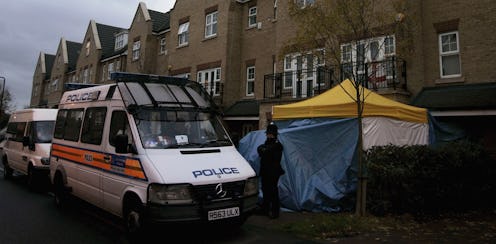News
Putin "Probably" Ordered Litvinenko's Death
The story of the 2006 radiation poisoning of a former KGB agent on the streets of London seemed as though it were straight out of a spy movie set during the Cold War. The former spy turned journalist and consultant suddenly took ill after being exposed to radioactive polonium. If that's not shocking enough, the story took another turn this Thursday as a British inquiry on the killing was released. Alexander Litvinenko's murder was "probably" ordered by Russian President Vladimir Putin, the report said.
There has long been suspected Russian involvement. According to the International Business Times, international arrest warrants have been issued for the two men accused of killing him, Andrei Lugovoi and Dmitry Kovtun, both of whom are Russian. They have denied any involvement. The United Kingdom has sought to extradite them but Russia has so far refused. Lugovoi is now a politician in Russia with Putin's support. After the release of Thursday's report, U.K. Home Secretary Theresa May ordered a freeze on the two's assets, BBC News reported.
The murder was likely ordered due to personal antagonism between Litvinenko and Putin, the 328-page report by Robert Owen, a retired judge, said. He said in the report that since the polonium had to be produced in a nuclear reactor, it must be a state body that killed him and not a criminal organization. He also explained that Lugovoi and Kovtun had no personal reasons to kill Litvinenko, pointing to an ordered killing. The report says that investigation into the FSB (the KGB's successor) shows an order of this magnitude would almost always be approved at the very top.
Putin's reasons for disliking Litvinenko were many. For one, he was close to leading dissidents in Russia that had accused the president and his administration of working with organized crime, Reuters reported. Then there was the fact that he had defected to the United Kingdom and had been accused of working with the U.K. intelligence agency MI-6. Litvinenko had been living in London since 2000. He had been brought up on charges in Russia for publicly denouncing a plot by the FSB to murder a Russian tycoon and oligarch.
Litvinenko's widow, Marina, welcomed the report. Her actions after her husband's death led to the inquiry taking place and she called for Russian intelligence officers to be kicked out of Britain and for sanctions to be put on Russia. "I'm also calling for the imposition of targeted economic sanctions and travel bans against named individuals, including Mr. [Nikolai] Patrushev and Mr. Putin," she said outside London's Royal Courts of Justice Thursday. Patrushev is the head of the FSB and was also named in the report.
Litvinenko is believed to have been poisoned while having tea with Lugovoi and Kovtun at a London hotel on Nov. 1, 2006. The evening after having tea he became sick and began vomiting. Three days later he went to the hospital and would not leave. He died just over three weeks after being poisoned, claiming from his deathbed that Russian President Putin was responsible for "everything that happened to him."
